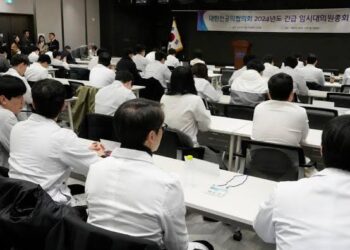Pregnant women have had C-sections revoked and cancer treatments shifted as of Wednesday because the number of South Korean trainee doctors who are walking off the job over suggested reforms have increased, according to local reports.
Over 8,800 junior doctors (71% of the trainee workforce) – have quit their jobs, according to Seoul’s Second Vice Health Minister, Park Min-soo, as part of a soaring protest against government plans to suddenly increase medical school admissions.
The Seoul government have said that the reforms are essential, quoting the country’s low doctor numbers and increasingly aging population, but doctors allege that the changes will immobilise service provision and education quality.
Critics say doctors are mostly worried the reform could wipe out their salaries and social prestige, and the plan is popular among South Koreans, many of whom are fed up with the wait times for many medical services.
On Wednesday, Park revealed that 7,813 trainee doctors had not been to work – an almost five-fold increase from the first day of the strike action on Monday – despite the government directing many of them to return to their respective hospitals.

He also added that South Korea’s general hospitals rely greatly on trainees for emergency operations and surgeries, and local reports have said that cancer patients and expectant mothers needing C-sections had seen procedures revoked or delayed, with scores of cases causing “damage”.
Junior doctors for their part, claim that the new medical education reforms were the final straw for a lot of workers in a profession already battling with tough working conditions.
The Korea Interns and Residents Association had said in a statement.
“Despite working for more than 80 hours a week and getting compensated at minimum wage level, trainee doctors have been ignored by the government until now.”
The Korea Interns and Residents Association had also said that an over-reliance on trainee doctors in the current healthcare system was not reasonable nor fair.
Nurses, who had been left in charge during the strike, encouraged doctors to go back to work, even as they sympathised with their colleagues over their fight against the reform.

















